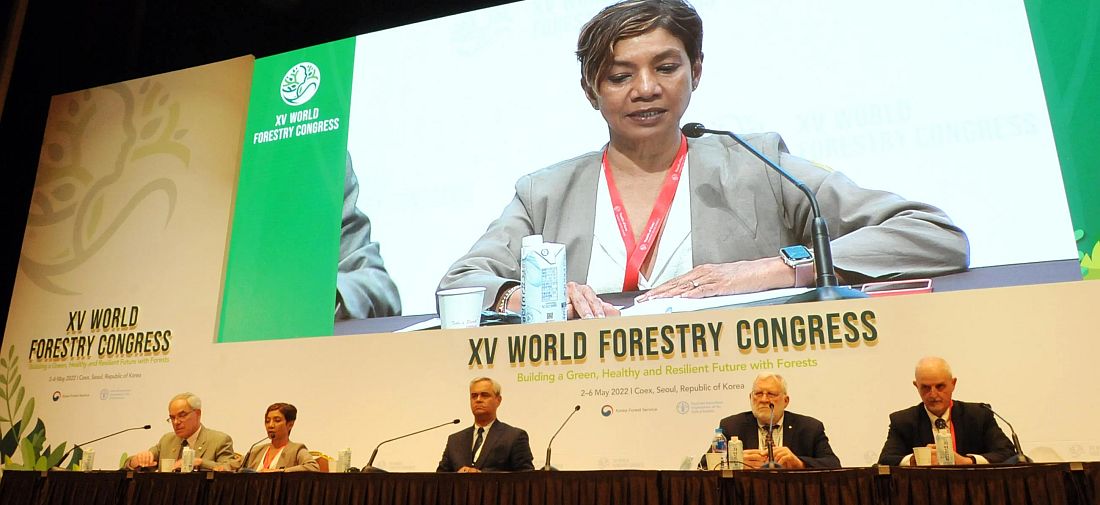XV World Forestry Congress: Let forests lead the way in a post COVID-19 world

©FAO/Pilar Valbuena
04/05/2022
Seoul - Forests have a key role to play in post COVID-19 recovery, through improvements in secure livelihoods and contributions toward sustained economic growth in the long term, organisation heads and forest experts agreed today at a special event during the XV World Forestry Congress.
The event, entitled ‘The role of forests in a post COVID-19 recovery: Re-imagining the future of forests’, discussed the restoration of ecosystems, forest landscapes, increased protection of wildlife and creation of forestry employment opportunities in a post COVID-19 world.
In her keynote speech, Maria Helena Semedo, Deputy Director-General of the Food and Agriculture Organization (FAO), said: “For the global economy’s recovery from the COVID-19 crisis to be durable and resilient, it must be environmentally sustainable and inclusive. It is clear that a broad multisectoral approach is required to meet the challenges of COVID-19 recovery.”
Semedo gave several examples of the roles forests should play in post COVID-19 recovery. She urged that forest communities, many of which are from the poorest and most vulnerable segments of society, be considered in the COVID-19 response. She also encouraged the sector to capitalise on society’s interest in forests and nature for physical, mental and spiritual wellbeing, which increased during the COVID-19 crisis.
“Currently challenges in the forestry sector can be turned into vehicles for transformation driving economic and behavioural change,” she concluded.
Forests in post-COVID world
Participants at the event discussed policy responses for 'building back better' and mitigating the impacts of COVID-19 on forests, the forest sector and forest-dependent communities, and potential ways forward.
Dian Sukmajaya, Senior Officer Forestry at the ASEAN Economic Community Department, gave a broad overview of the impacts COVID-19 had on ASEAN countries and Peter Gondo Inter-regional Adviser at the United Nations Forum on Forests, highlighted the lack of financial resources available in developing countries, urging international cooperation. Angela Coleman, Associate Chief of the US Department of Agriculture Forest Service, discussed the impact that the COVID-19 pandemic had on US forestry and what could be learned from the pandemic for the future management of forests and trees.
Priya Shyamsundar, Nature Conservancy’s Lead Economist, spoke of how vital it is to involve smallholder farmers, who make up 94 percent of farms globally, in land restoration initiatives. Robert Nasi, Director General of the Center for International Forestry Research, laid out how forests can contribute to sustainable pathways in a post COVID-19 world. José Carlos da Fonseca, Brazilian Tree Industry’s Executive Director, described how the pandemic accelerated certain areas of development, including sustainable forest products. John Stanturf, Visiting Professor from the Estonian University of Life Sciences, highlighted, amongst other issues, wildfire as a key concern and underlined the need to address this in recovery plans.
More on this topic
The event, entitled ‘The role of forests in a post COVID-19 recovery: Re-imagining the future of forests’, discussed the restoration of ecosystems, forest landscapes, increased protection of wildlife and creation of forestry employment opportunities in a post COVID-19 world.
In her keynote speech, Maria Helena Semedo, Deputy Director-General of the Food and Agriculture Organization (FAO), said: “For the global economy’s recovery from the COVID-19 crisis to be durable and resilient, it must be environmentally sustainable and inclusive. It is clear that a broad multisectoral approach is required to meet the challenges of COVID-19 recovery.”
Semedo gave several examples of the roles forests should play in post COVID-19 recovery. She urged that forest communities, many of which are from the poorest and most vulnerable segments of society, be considered in the COVID-19 response. She also encouraged the sector to capitalise on society’s interest in forests and nature for physical, mental and spiritual wellbeing, which increased during the COVID-19 crisis.
“Currently challenges in the forestry sector can be turned into vehicles for transformation driving economic and behavioural change,” she concluded.
Forests in post-COVID world
Participants at the event discussed policy responses for 'building back better' and mitigating the impacts of COVID-19 on forests, the forest sector and forest-dependent communities, and potential ways forward.
Dian Sukmajaya, Senior Officer Forestry at the ASEAN Economic Community Department, gave a broad overview of the impacts COVID-19 had on ASEAN countries and Peter Gondo Inter-regional Adviser at the United Nations Forum on Forests, highlighted the lack of financial resources available in developing countries, urging international cooperation. Angela Coleman, Associate Chief of the US Department of Agriculture Forest Service, discussed the impact that the COVID-19 pandemic had on US forestry and what could be learned from the pandemic for the future management of forests and trees.
Priya Shyamsundar, Nature Conservancy’s Lead Economist, spoke of how vital it is to involve smallholder farmers, who make up 94 percent of farms globally, in land restoration initiatives. Robert Nasi, Director General of the Center for International Forestry Research, laid out how forests can contribute to sustainable pathways in a post COVID-19 world. José Carlos da Fonseca, Brazilian Tree Industry’s Executive Director, described how the pandemic accelerated certain areas of development, including sustainable forest products. John Stanturf, Visiting Professor from the Estonian University of Life Sciences, highlighted, amongst other issues, wildfire as a key concern and underlined the need to address this in recovery plans.
